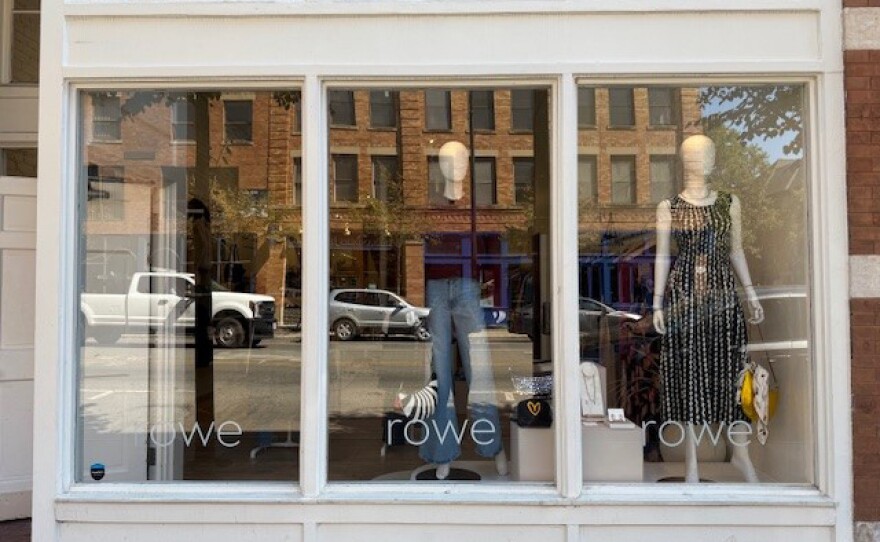Increased tariffs on imported goods are causing some business owners to reassess their purchases. The tariffs are part of the Trump administration's policy to make imported goods less competitive than domestically-produced ones, but consumers could be paying higher prices.
Maren Roth owns the Rowe Boutique on High Street in the Short North. She also serves on the Short North Alliance Board.
Roth spoke with WOSU’s Debbie Holmes about how tariffs are affecting her business.
Debbie Holmes: What are you seeing right now for goods that you're purchasing for your store?
Maren Roth: We are seeing price increases. Everything's going up about $10 to $20.
Debbie Holmes: That's per item?
Maren Roth: Yeah, per item, at least from existing items we already had in our store. And then the ones we've reordered, those are the ones that have been going up.
Debbie Holmes: All right, is this like a boutique clothing store?
Maren Roth: It is, women's contemporary clothing.
Debbie Holmes: Where are you buying your products from?
Maren Roth So, I source my products mostly in New York, but the brands are from all over the world.
Debbie Holmes: So they're made overseas?
Maren Roth: They're either made overseas or the materials come from overseas and then they're put together in the U.S.
Debbie Holmes: So, tell me again, how much more are you paying for your goods then?
Maren Roth: I would say it's gone up about 15% to 20%.
Debbie Holmes: Now I've heard of some businesses that are absorbing costs at least for a while. How are you handling this?
Maren Roth: It's kind of a two-part answer, I guess, because some of our brands are also absorbing those costs for us. At least they were at the beginning. I'm going to market to buy for spring 2026. So, I think that's really where we will see the impact, the full impact. But for current goods that we're bringing in, that we've had in the store before, say, we're reordering a belt or a necklace, those are going up already. And so those costs are being passed on to us. Some of the cost is being absorbed by the brand and some of it's being absorbed by us, but we do have to increase our prices nominally.
Debbie Holmes: Can you give me an example of a shirt, a sweater, or something that you sell, and how the cost has changed?
Maren Roth: This happened yesterday, so we have a current belt that we carry in the store. It was previously $108, and it's now $118.
Debbie Holmes: What is the response you're getting from your customers? Are they seeing these price increases?
Maren Roth: You know, it's so new really for us. We haven't really seen a response yet. Our sales have stayed steady so far throughout the summer. I mean, the summer is always slow, so it's not a great read. But, you know, some people will notice. Some people will comment, especially if they bought the item before and they want it in a new color. And some people probably won't notice. The price point that we're at is a little bit higher in general. So, it tends to be probably a little more overlooked at this point, unless it's a really expensive item. Like let's say a $800 jacket is now going to be $1,000.
Debbie Holmes: What about your U.S. sources? Is there anybody in this country that you could rely on?
Maren Roth: That’s a great question and I don’t have an answer for you. You know, a lot of our brands are small brands, just like we're a small store. So, we're all just struggling to keep costs down for our clients by still being able to make a profit.
Debbie Holmes: What is your strategy? Have you laid out something like, here's my plan?
Maren Roth: I guess my plan is to be a little more conservative to try and bring in those items that I feel aren't so expensive that people have sticker shock when they're looking at it. That might mean having to cut back on some of the pieces that we're bringing in from brands that we love, maybe not bringing those brands in at all, which just kills me. And just trying to be a lot more price conscious as we go forward. And I'm just really navigating this as we're going. I don't have a great strategy yet. And I think everybody was kind of holding their breath when this was first announced, and then it was rolled back and then on hold. And it's all been so confusing that I don't have a great strategy. I wish I did. So I really think going into market, I'm leaving tomorrow. I'm going to see how we're going to be impacted going forward because there's going to be new orders we're going to be placing.
Debbie Holmes: Are you going to New York?
Maren Roth: I am.
Debbie Holmes: Are you at risk of having to close or cut workers?
Maren Roth: I hope not. We have a pretty small team. We're really good at sort of adapting to what we're given. You know, I'm 18, almost 19 years into this business. And my hope is, because we do run pretty lean when it comes to that, the employment side, that we're able to, you know, keep our current staff. And we just might have to bring in, you know, lower-cost items or items that necessarily we didn't carry before, but maybe we're opening our eyes to.






